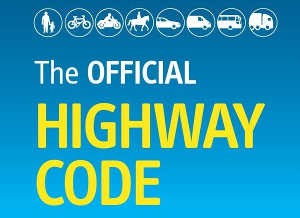The New Highway Code Rules As Winter Hits

It has been recently reported UK temperatures will start dropping sharply over the coming weeks, motorists are being reminded to clear their windscreens properly when frost or face penalty points and fines.
Old-fashioned methods like quickly ‘portholing’ will no longer be acceptable on icy mornings and could see drivers of new and used vehicles hit with a £60 fine and three penalty points.
‘Portholing’ is a term used when motorists clear enough ice off their windscreen to just about see out. Rule 229 of the Highway Code states that before driving off you need to make sure all snow and ice is cleared from vehicle windows.
It’s not just icy windows either, the code includes mist and condensation if visibility is obstructed, and if snow falls on the vehicle, motorists are required to clear any snow from the roof to avoid it falling off and obstructing other road users.
During these wintery months, another new Highway Code rule which could see motorists hit with fines refers to vehicle visibility. New vehicles made after 2011 come fitted with ‘daytime running lights’ (DRLs) for visibility, drivers will be required to turn on dipped headlights or brighter lights for visibility to help other road users, those failing to do so could receive up to a £1000 fine.
According to the Highway Code, all vehicles will need DRLs that automatically switch on once the engine starts.
Richard Gladman, from IAM RoadSmart, said: “Don’t rely on the performance of your car systems to get you out of trouble – allow time, make sure you have good visibility all round and carry the right equipment. “If conditions are extreme, remember the best advice is not to travel.”
Visibility on the road is even more important in poor weather conditions, but so are other things, tyre condition for example, if in doubt visit your local motor trade tyre dealer for advice.
Minimum tread depth for cars is 1.6 millimetres around the circumference of the tyre and through the central three quarters of tread width according to the Highway Code. Police can enforce a £2,500 fine and three penalty points per tyre that doesn’t meet these requirements!
Your insurance broker will not be too impressed when you call to inform them if you fallen fail of the law, it will also impact your private or motor trade insurance policy premiums going forward.
The Department for Transport states windscreen wipers ‘must be properly adjusted and maintained in efficient working order’, failure to do so could also lead to a £2,500 fine and three penalty points.

Headlights, brake lights and any other vehicle parts can also cause you problems if not working properly, police can issue a £100 spot fine and three penalty points, along with a ‘vehicle defect rectification notice’ giving drivers 14 days to prove the problem has been fixed.
We all know windscreen cracks and chips can impact road safety. The Highway Code states that all vehicle windows should be maintained and kept in good condition, if you have a chip contact your local mobile window screen repair company before it turns into a crack.
If a police officer decides you’re driving a vehicle in a dangerous condition, you could be looking at a £2,500 fine and three points.
All vehicles must also be fitted with windscreen wipers and washer capable of cleaning the windscreen according to Section 34 of the Road Vehicles Regulations 1986. Failure for a vehicle to have no washer fluid could be considered as careless driving, an offence where on-the-spot penalty fines and points can be issued.
Different seasonal conditions will create additional scenarios where we all need to be more aware of our responsibilities, surroundings, and other road users.







